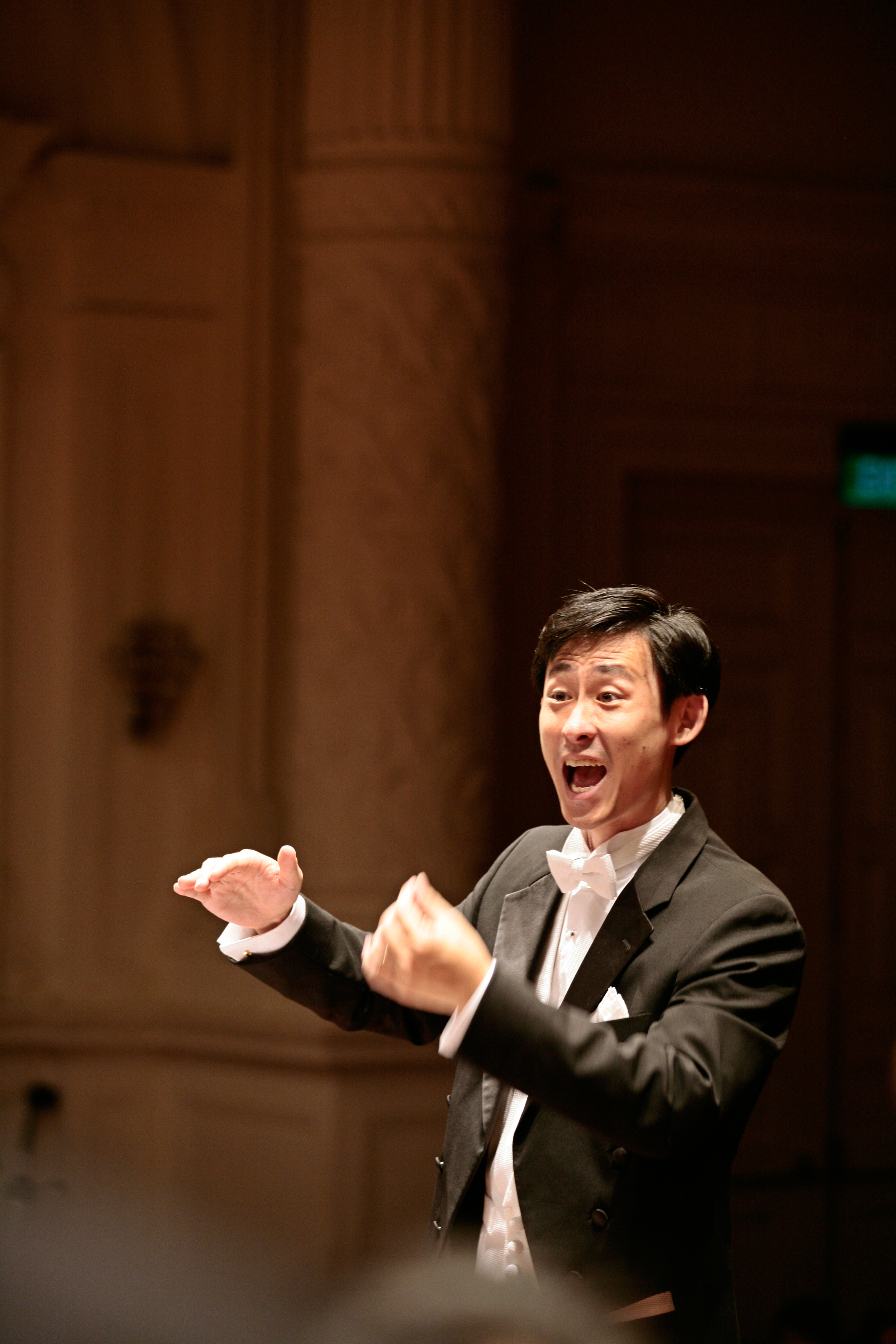“Music to me is a realm. It brings me into another realm. When the music is taken to another realm, I always call it magical.” – Mr Toh Ban Sheng, award-winning choral conductor
By Li Yen
In 1999, Mr Toh Ban Sheng, a self-taught conductor, stood on the stage of the historic Victoria Concert Hall with Raffles Junior College Chorale. They were participants in the SYF Choral Competition – the most prestigious choral competition in Singapore, which came with a cash prize of $30,000 for the winning choir.On that nerve-racking day, his choir was the last group to perform. They had to perform five songs; an avant-garde music piece was part of their repertoire that evening.
Mr Toh enjoyed every minute of his time on stage. In his hands, every note became a joyous beat, blending seamlessly with the singing, making one breathless.
He told his choir: “If people close their eyes and they can image five different choirs on stage, that would be our greatest achievement.”
“One of the things we worked on was to make sure that each of the music was as authentic as it could be. And each one was as different as it could be,” he said.
On that fateful night, Raffles Chorale was crowned the ‘Best Choir’ of the year. That win came as a beautiful surprise for Mr Toh, who was an underdog in that competition.
“Victory was sweet, but the intrinsic reward of working towards an unreachable musical perfection was even more fulfilling,” wrote Mr Toh in his autobiography entitled ‘The Accidental Conductor’.
Since then, he has been catapulted into the limelight of the local choral scene.
Musical Affinity
The sweet success made Mr Toh ponder about his music potential. For somebody who has no formal academic background in music, winning the SYF Competition was tantamount to achieving the impossible. “What if I had pursued a formal education in music?” he thought.
Growing up in a traditional Chinese family in Kuala Lumpur, Mr Toh, who has loved music since young, was denied formal music training – his parents believe music is not an ‘iron rice bowl’.
Although he was not musically trained, his first experience of conducting a church choir came when he was 15.
In 1989, Mr Toh arrived in Singapore to further his studies in the National University of Singapore (NUS). After graduating with a Bachelor of Science degree in Physics in 1992, and receiving a Post-Graduate Diploma in Education in 1994, he began his teaching quest and was given the opportunity to conduct the Temasek Secondary Choir. Later, he was offered the same role by the principal of Dunman Secondary School.
When he was not teaching, he spent his time training as a baritone singer with Cultural Medallion winner Choo Hwee Lim, and earned himself his first formal music qualification in 1996, at the age of 26.
He described Mr Choo as a wise man and a major influence in his music career, who taught him musicianship and the grace of teaching.
After three years of classroom teaching, Mr Toh was transferred to the Co-Curricular Activities Branch of Ministry of Education (MOE) to carry out music-related work. It was during his third year with MOE when his Raffles Chorale won the best choir of the year.
Thereafter, he made a bold move. He resigned from his Music Specialist job with the MOE, and began a full-time music career as a freelance conductor.
A short while after wholeheartedly devoting himself to choral conducting, winning ‘Best Choir’ for the second year running and being appointed conductor for the 800-strong choir at the ‘Millennium National Day Parade’, Mr Toh decided to fulfil his dream of attaining higher music qualifications.
In 2000, he flew to the US to complete double master degrees in Choral Conducting and Voice with the University of South Carolina under a National Arts Council (NAC) bursary.
“For me, the Master degree was a kind of consolidation, definitely,” he says.

Conducting – The Art of Communication
Mr Toh has an undeniable charm and possesses a gentle countenance. When he speaks about music, his tone carries a measure of pride and gratification.
What drove him into music conducting without any music background?
“Frankly speaking, I don’t know. Perhaps a part of it is inborn – the way you hear music, the way you interpret music,” opines the former physics teacher humbly.
“Maybe because I love singing, so mentally or psychologically, I think a lot for singers. The gestures have certain ways of helping people psychologically,” he explains. Mr Toh still sings in a group called Amoris Singers.
His music career might have appeared to come naturally to him, but it did not mean any less hard work and wholehearted dedication.
“I remember in 1999, I spent quite a bit of time in my cubicle working through my gestures,” he recalls.
In church, he had training in basic conducting patterns such as 3/4 and 4/4, but beyond that, “it is really an imagination of what kind of sounds you want the choir to make”.
“I guess I am quite imaginative with my gestures,” he remarks.
As a conductor, Mr Toh devotes himself fully to his job. He believes that in addition to the technical aspect, the communication that happens during rehearsals is crucial for good conducting.
“Conducting involves a lot of vocabulary. Conducting gestures have certain ways of communicating certain technical aspects. If you communicate more with your choir, they will understand you more,” says the eminent choral conductor.
“Maybe a twitch of an eyebrow could be communicating something. So I think that comes with understanding.”
Communication in the psychological aspect could send certain vibes to the choir, he asserts. “It is very affirming,” he says.

“I think that the human voice communicates big reservoirs of emotions and colours. When the music is really beautiful, it can transform lives.” – Mr Toh Ban Sheng, award-winning choral conductor
A Magical Realm
Since completing his double master degrees, Mr Toh has led his choirs to amass over 70 gold awards in various prestigious national and international competitions held in Austria, Belgium, Bulgaria, Czech Republic, Finland, Germany, Lithuania, Poland and Slovakia. The distinguished conductor is also the recipient of the Young Artist Award in 2006 and the Conductor’s Prize and Repertoire Prize in 2003 at the 4th International Competition Festival of Advent and Christmas Music in Prague.
His most memorable competition would be the 58th European Music Festival for Young People held in Neerpelt, Belgium, in 2010, in which his choir clinched the First Prize Summa cum Laude – the highest accolade to be given out.
“It was a very rare competition as it required unison singing, and unison singing is the hardest. It tells when you don’t blend and aren’t in tune,” he says. “I chose a Chinese song called ‘Yan Zi’.”
After the performance, Toh felt overwhelmed. “It was really magical! It was so unison and yet so profound,” he recollects.
Apart from unison singing, his choir also performed another song by Perry, which depicts an old belief that “when you die, you will go to a better place and meet your loved ones there”.
“They did that song almost to the perfection which I wanted them to. I was moved to tears,” he exclaims.
When everything is falling into place, and the singers know what they are singing about and are in an ‘out-of-the-world’ zone, he feels that that is “the most fulfilling experience on stage”.
“Music to me is a realm. It brings me into another realm. When the music is taken to another realm, I always call it magical.”
He believes the artistic goal of conducting and vocal singing is to be “a great servant of the music” and “bring the music alive and touch people”.
“I think that the human voice communicates big reservoirs of emotions and colours. When the music is really beautiful, it can transform lives,” he says.

The Purpose of Music Appreciation
An educator at heart, Mr Toh also treasures choral conducting as a platform to impact the lives of young singers.
Currently, he is the resident conductor of St. Joseph’s Institution Vocal Ensemble, Catholic Junior College Choir, Raffles Chorale and Raffles Voices.
The father of a teenage daughter believes educating the younger generation about the importance of music appreciation is an imperative part in cultivating a refined aesthetic sense. He feels that if a person grows up not learning how to appreciate art and music, this person would not know how to preserve or appreciate the beauty in many things.
“I think music makes humans a lot more sensitive to one another. That is the purpose of music appreciation,” he affirms.
“If someone is in pursuit of beauty, it makes them a better person – more sensitive, more responsible.”
















